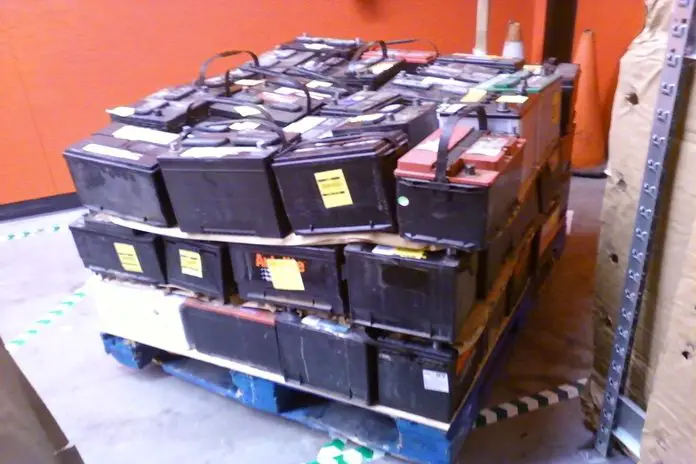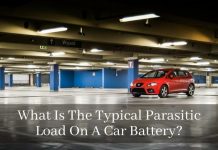
How many car batteries to run a house is a question often asked by people like me who are planning a backup home energy system to the main energy supply of our homes. I finally found the answer to it, If you live in an area where power outages are a common occurrence especially during bad weather, you should read on.
How many car batteries do I need to power a house? An average household like mine that requires 90 kWh of energy for three days would need 38 6 volt batteries rated at 400Ah that supply 2.4 kWh of power per battery.
Let me elucidate on that answer. You see, as per The US Energy Administration, most American households have a monthly energy consumption of 901 kWh or 30 kWh daily. The 90 kWh is for a 3-day battery power system. This is a realistic assumption of the number of days a home may require a backup power system for the disruption of its main power supply.
As to the 2.4 kWh energy capacity of each battery, this is also an approximation. Batteries are rated in amp-hours or Ah and they come in 6 volts, 8 volts and 12 volts operating voltage.
To compute for a battery’s energy capacity, multiply the amp hour rating of a battery with the operating voltage and divide it by 1,000. So that a 6-volt battery with a 400 Ah rating has around 2.4 kWh of energy capacity (6 volts x 400Ah / 1,000 = 2.4 kWh).
The number 38 was arrived at by dividing 90 kWh by 2.4 kWh. (90/2.4 = 38)
Why Do You Need A Home Battery Power System?
Home battery power system or home battery storage is becoming very popular because of its backup power features. A battery bank will provide your home with power when the grid or other main power supply such as solar and wind power systems are down.
During extreme weather disturbances such as hurricanes, a backup battery power system makes a lot of difference to a home.
With the continuing climatic changes, rising temperature and surging sea levels, stronger hurricanes are to be expected in the coming years. We, who have suffered from past storms, are very much aware of the angst and misery that comes during and after such a violent weather disturbance. One after-effect of a hurricane that compounds the misery is the loss of power or electricity.
According to reports, 7.9 million households and businesses had no electricity in the District of Columbia and in fifteen other states after the destructive Hurricane Sandy in 2012.
Several days after Sandy, the US Energy Administration also reported that in New York City alone, about 67% of gas stations run out of gas for sale, making generators in homes and businesses almost useless.
Forward-looking homeowners who planned and prepared for such an eventuality by having a home battery power storage were more fortunate. They were able to buy more time and had lights, at least, until the grid was up again or until their batteries were completely discharged, whichever came first.
For those using solar or wind power, battery backup power also plays an important role in mitigating the effects of the power supply fluctuation from these renewable energy sources. We all know how capricious the sun is even at the height of summer.
Why A Battery Backup System And Not A Generator?
Those who live in localities where power outages are quite ordinary occurrences are very much aware of the advantages of having a backup power system. But, the most common system used is a generator powered either by diesel, propane or natural gas.
A newer, better and cleaner backup power option, however, is the battery power system which serves the same purpose as a generator
In this section, let me give you a comparison between a conventional generator and a backup system powered by batteries taking into consideration cost, power source, and operation & maintenance.
Cost
The initial cost of a backup power system will depend on how much power you need for your home.
For an average household like the example earlier, A 3-day power supply requirement of 90 kWh ( 30 kWh per day) will require 38 6 volt batteries rated at 400Ah. The current price of such batteries range from $300 to $500 depending on the brand. Given that, your upfront cost for a battery backup power would be between $11,400 to $19,000.
On the other hand, the price ranges of a 30kw diesel generator is from $4,000 to $8,000, again depending on the brand.
You’re right, the upfront cost of a battery backup system is almost twice as much as that of a conventional generator. You must remember, however, that a generator is powered by fossil fuel, diesel in this instance. You will have an operating cost for the fuel as long as you’re using the generator.
On the contrary, batteries don’t need to be fueled. You can charge them from any power outlet or even by solar power, so there isn’t any operating cost.
In the long run, a battery backup power will turn out to be much cheaper.
Power Source
The main consideration in operating a backup power system is the source of energy of the system.
Generators are fueled by either propane, natural gas or diesel. As long as you’re using a generator you will continually spend to operate it. It is good only as long as there is fuel available. In cases like the aftermath of hurricane Sandy where even gas run out of supply, generators are useless.
In comparison, the source of power of batteries is electricity. You can charge your batteries from any electrical power outlet in your home. Once your batteries are fully charged, your system can provide you the electricity your home needs for a period of time. If you use power sparingly, that is, you only use the system to light your home and work the most important and basic electrical devices, you can buy rime.
A battery storage system can also be powered by solar energy. Once the sun is out, you can charge your batteries from a solar panel system if you have one. A combination of a solar energy system and a battery storage for backup will be discussed later in this article.
Operation And Maintenance
A concern when you’re using a generator is the noise and fumes it produce while it runs. Generators are noisy devices and since they run on fossil fuel, they exude smoke and noxious gas that is harmful to the health.
Batteries are a cleaner, quieter and greener option. A battery bank does not burn any fuel so there is no gas fume to contend with, plus, they operate quietly.
When it comes to maintenance, the batteries used for a power storage system are mostly sealed Absorbent Glass Mat (AGM) deep cycle lead acid batteries that do not require maintenance. Whereas, generators need regular testing to make sure that they are in good working condition when needed.
Solar System With A Backup Battery System
Pairing a solar system with a backup battery system offers a lot of advantages to a homeowner. The upfront cost may be a little more expensive than a generator, the savings on electric bills and fuel cost will eventually pay for the initial cost and still save you some money. (I have written about one of the most popular solar system for the review, click here).
This also assures you of having power whether the grid is up or down. All that is required is for you to harvest the sun’s energy with solar panels and store the sun’s power in your battery bank.
When the sun is up, your solar system powers your home. During inclement weather, when the grid is down and the sun is in hiding, the stored electricity in your battery bank takes over. This means that you won’t suffer any power interruption whatever the weather condition is.
Traditional solar systems are tied to the grid and they only work when the grid is up. Any excess energy harvested by the solar system goes back to the grid. When there is power interruption the solar system also shuts down and homes are left in the dark.
With a battery backup storage system, the excess energy gathered by the solar panels are channeled to the battery bank. When there is power interruption, the inverter in the backup system takes over and the stored power in the battery bank lights your home and runs your electrical devices.
This way you do not only save on your power bills, but you also protect your home and your family from the inconvenience of a power outage.
Conclusion
How many car batteries to power a house is a valid question for those of you who are thinking of having a battery storage system for your home. It won’t come cheap, but not having one could be a more expensive and irresponsible option. This is especially true when you live in an area where power outages are not unheard of.





